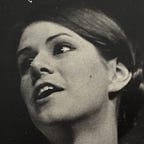Why I Am Happy When My Stories Make Readers
Hemingway’s words warped my response to death
This article is spawned by Jay Vaananen’s comment that he wept openly while reading one of my posts. I was pleased and equally unnerved then quickly horrified. What is wrong with me? Have I become some sort of degenerate that I derive comfort from someone else’s tears? Even though I cried as I wrote the piece.
There’s a line from the film, Memoirs of a Geisha, that sums up my grief after the death of my lover, my friend, my husband of 42 years.
“You cannot read loss — only feel it.”
Writing about loss is one way I manage my grief. Yet no matter the method (handwritten journals, typewriter poems or computer-corrected copy) words are not enough. I want readers, I want you, to feel my loss.
I could throw the whole Oxford English Dictionary at you and add in a Roget’s Thesaurus as a chaser and it still wouldn’t make a dent in describing the pain not only in my mind, but in my muscles, my blood and my bones.
I want readers to feel that pain — the gnawing ache rooted so deep inside me that neither a scalpel nor butcher’s knife could cut it out. The pain of grief is so relentless, so all-encompassing, so eternal.
I have no choice but to struggle with my sorrow. But why do I wish such fate on a reader? Why would you willingly accept the burden and read on?
I blame Hemingway
Moments after my husband’s last breath, our doctor stepped outside to give me time alone with him. The first and only thing in my head was the final scene from Ernest Hemingway’s novel, A Farewell to Arms.
Hemingway’s main character, Frederic Henry, kicks the nurses out of a hospital room so he can be alone with his wife who has just died:
“But after I had got them out and shut the door and turned off the light it wasn’t any good. It was like saying good-by to a statue.”
— Ernest Hemingway in A Farewell to Arms
A cold, hard, unyielding marble statue is all my brain could see and sense after reading that closing scene in ninth grade. I couldn’t unread the words. So the last page in A Farewell to Arms became my mind’s first reference and emotional response when coming face-to-face with death. A circumstance I’ve lived more than once.
Encountering Death
It was Hemingway’s final scene that flooded my mind when I got a fateful phone call. Saturday morning in March 1985, it was my mother-in-law. Her frail voice kept repeating again and again, “I can’t wake up Daddy” (with the onset of Alzheimer’s she’d started calling her husband Daddy).
“He’s so cold, he’s so cold, Daddy is so cold.”
We arrived within 30 minutes. My father-in-law had passed away at age 84, peacefully, in his sleep, in his bed. There was no sign of illness or trauma. He just went to sleep and never woke up. Much to my regret and linked directly to Hemingway’s words and my mother-in-law’s laments — I did not touch my father-in-law’s hand or kiss his brow to bid him a final goodbye.
An act of cowardice on my part because I truly loved the man. But I didn’t want the memory of touching cold, lifeless flesh seared in my mind’s eye. I did not want my last encounter with such a warm, loving man to be as chilling and permanent as the mark that Hemingway had left on me.
Bidding my love adieu
I was holding my husband’s hand when he died. It was still warm belying the statue scenario, crafted by Hemingway, that had shaped my perspective and my fears for decades.
It made me brave. So I crawled into the bed with my husband. My last chance to nuzzle his neck and to bury my face in his chest as was my habit when he comforted me. His body was still warm. But he could no longer put his arms around me, cradle me, hold me.
Lying next to him a final time, surrounded by his paintings, drawings, books, and photos, only then did my tears come.
I sobbed quietly. I thanked him out loud for our wondrous 42-year adventure. I had promised him I would be happy — should he die first. I would take care of myself, exercise, be with people, find joy. I made those promises not knowing the true emotional and physical pain of loss.
A reader’s tears
I can’t do this alone. That is why I write about my great love and great loss. I write not to cause anguish but to make clear that a loving, caring, kind, funny and oh-so-talented man is now gone.
If my article evokes tears, if my words echo in the mind long after being read, I will know that the reader understands. I will know that the reader feels my loss. I will know that my husband will live on in that reader’s memory. And that makes me happy.
